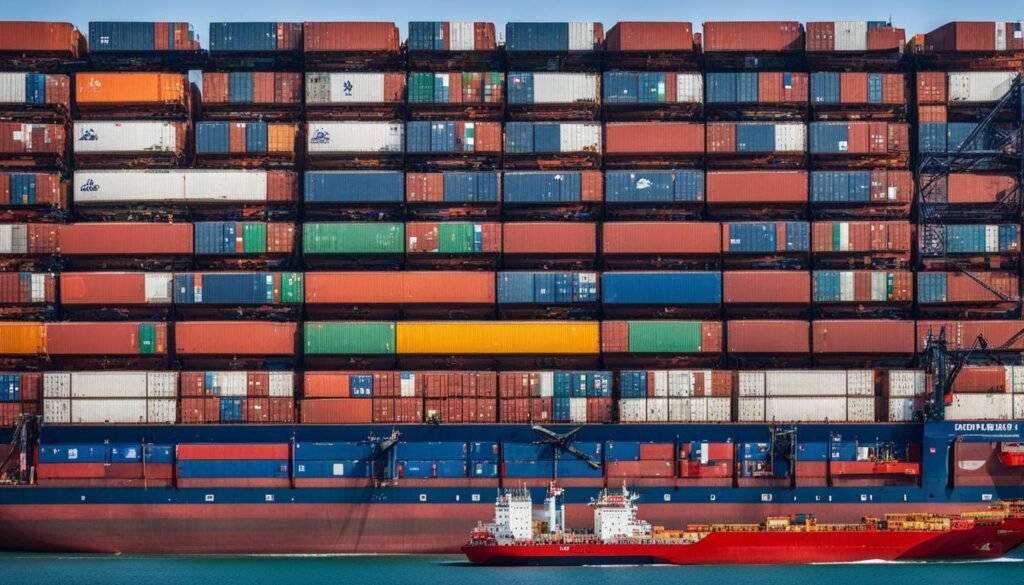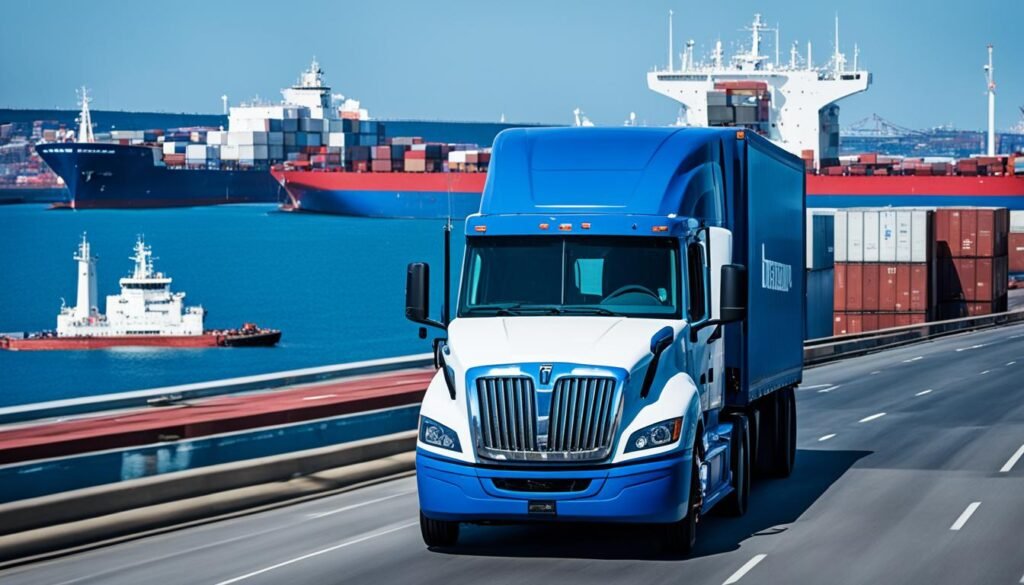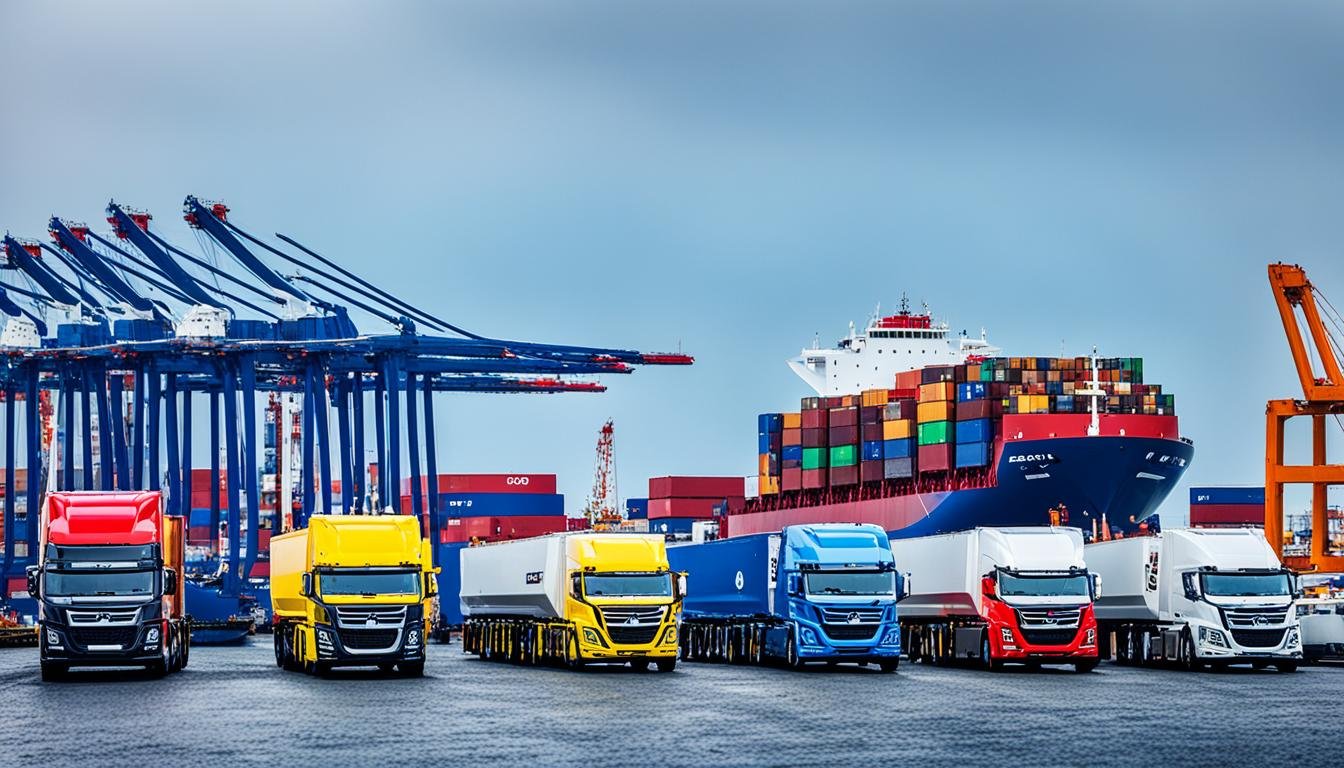International fleet vehicle shipping is key in moving vehicles across the globe. It helps businesses with operations worldwide. By shipping cars, trucks, or other vehicles, it ensures they arrive safely and on time.
Thanks to global logistics, businesses can reach customers around the world. It supports the movement of vehicles for manufacturers & rental companies. This helps these businesses keep up with customer demands and stay efficient.
Global logistics providers use advanced technology to simplify vehicle shipping. They take care of documents, customs, and regulations. This allows companies to focus on their main work.
Key Takeaways:
- International fleet vehicle shipping is crucial for global businesses.
- Specialized logistics expertise makes the shipping process smoother.
- Efficient shipping helps businesses grow and keeps customers happy.
- Proper documentation and following regulations are vital for success.
- Choosing a reliable logistics partner is key to smooth transport.
The Impacts of Globalization on International Maritime Transport Activity
Globalization changed how ships move goods all over the world. It made the needs, styles, and future of sea shipping grow big. Globalization opened up the world’s economy more. This led to more trading, linking markets across the globe. Now, companies need good sea shipping more than ever.
Ships carry more now, thanks to globalization and world trade chains. These ships make sure goods get from one place to another smoothly. They keep the world economy flowing, bringing countries closer through trade.
“Globalization has reshaped the landscape of international maritime transport, creating new opportunities and challenges for the shipping industry and global trade.”
The future of sea shipping looks bright with new tech. Things like automation and going digital are making shipping smarter and cheaper. The past trends and future perspectives of international maritime transport also show the importance of saving energy and being green. People are working to make shipping friendlier to the planet.
Maritime Shipping and Goods Movement
Maritime shipping is vital for moving goods around the globe. It connects different types of transport and boosts international trade.
It’s great for sending goods worldwide. Big ships can carry lots of stuff, which is cheaper than other ways. It also goes to places hard to reach otherwise.
Maritime shipping works with air, road, and rail. This makes a smooth system. Which way to move items depends on what they are, how far they go, and how fast they need to get there.
When there’s a lot to move, ships are a top pick. They’re good for big and heavy things like machinery and cars.
Choosing how to move goods also considers time, money, and trust. Ships can take longer but cost less. It’s a good pick for things that aren’t in a hurry. Trusting that goods will get where they’re going on time is key.
Ships can be swapped for planes if things need to go fast. But, flying can be pricy. Mixing ways, like using both ships and trucks, can make moving goods smart and efficient.
Collaborative Approach in Delivering Containerized Cargo
Getting cargo from ship to shore takes teamwork. Shipping firms, ports, agents, and customs need to work together.
Shipping companies are the lifeline for sailing cargo. They have many ships ready to go. Choosing a good shipping partner is important for safe and on-time goods moving.
Ports are where ships dock to load and unload. They make sure this happens well, and connect ships to land transport.
Freight forwarders help things get from seller to buyer. They know how to pick the best way to move things, handle paperwork, and work with customs.
Customs check that goods meet the rules. They help things go smoothly across borders. They look over documents, check items, and collect fees.
Ships are a big part of moving goods worldwide. They work with others like air and ground transport to get things where they need to go. Companies, by working together and choosing smartly, can move goods smoothly all over the world.
International Shipping Basics
When shipping things overseas, it’s vital to know the basics. This is important for both growing businesses and people sending packages abroad. You need to plan carefully and understand the key points of international shipping.
Choosing the right shipping company is a crucial first step. These companies are experts in moving items across borders and offer many services. Make sure to pick a well-known company skilled in international shipping. They should offer reliable options for your shipment.
Understanding INCOTERMS is also key. These terms show who is responsible for what in a global trade. They cover costs, risks, and when the delivery is done. Knowing common INCOTERMS helps make deals go smoothly and prevents confusion.
Dealing with paperwork and rules is a big part of shipping internationally. Each country has its own rules and documents needed for customs. You might need things like invoices, lists, and licenses. Following these rules closely avoids customs delays or problems.
Don’t forget about shipping insurance. It protects your items if they’re lost, damaged, or late. Learn about the types of coverage available and pick what’s best for your goods.
How you pack and label items is vital for safe shipping. Proper packing protects your items during travel. Think about how they’re being shipped, their fragility, and any weight limits. Clear labels help ensure your packages are taken care of from start to finish.
Getting your goods to their destination safely and on time involves careful planning. You must meet regulations, work with your shipping partners, and pay close attention to every step. With the right knowledge, you can ship with confidence.
Key Points:
- Selecting a reputable shipping company is crucial for international shipping.
- Understanding INCOTERMS helps clarify responsibilities and obligations in international trade transactions.
- Compliance with documentation and regulations is essential for smooth customs clearance.
- Insurance provides financial protection in case of loss, damage, or delays during transit.
- Proper packing and labeling ensure the safe handling and transportation of goods.
Tips on International Shipping from the U.S.
After you sell something to another country, you need to ship it. This can be a big challenge. It’s important to pack, label, and document your goods correctly. Don’t forget about insurance. These steps help you ship internationally with ease and less risk.
Packing
Good packing keeps your items safe on their journey. Think about what you’re sending. Use the right boxes, padding, and protection. Keep the weight even and don’t stuff the boxes too full.
Labeling
Putting the right labels on your packages is very important. Include all details needed for delivery. This means the recipient’s address, your contact info, and any special shipping marks. Add a return address just in case.
Documentation
Don’t forget the paperwork. Make sure you know what documents you need. This could include commercial invoices, lists of what’s inside, and more. Double-check that everything is correct and meets the destination country’s rules.
Insurance
Shipping insurance is a must. It protects your items from damage, loss, or delays. Figure out the worth of your shipment, and then get the right insurance. A specialist can help you pick the best coverage.
In international shipping, details matter a lot. By being careful with packing, labeling, paperwork, and insurance, your goods are more likely to arrive safely. This makes your customers happy.

Commonly Used INCOTERMS for International Shipping
| INCOTERM | Description |
|---|---|
| EXW (Ex Works) | The seller makes the goods available at their premises, and the buyer is responsible for all transportation costs and risks. |
| FOB (Free On Board) | The seller is responsible for delivering the goods to the port of shipment and loading them onto the vessel. The buyer is responsible for all subsequent transportation costs and risks. |
| CIF (Cost, Insurance, and Freight) | The seller is responsible for delivering the goods to the port of destination and arranging transportation and insurance. The seller bears all costs and risks until the goods are loaded onto the vessel. |
| DDP (Delivered Duty Paid) | The seller is responsible for delivering the goods to the buyer’s specified location, handling all costs and risks, including import duties and taxes. |
Working with Freight Forwarders
Freight forwarders are key in international shipping, connecting exporters with carriers. They’re experts in handling shipping’s complex challenges and rules. This makes freight transport smoother and more efficient.
They know a lot about different shipping ways, like by air or sea. Freight forwarders help pick the best way for your goods, considering size, urgency, and where they’re going.
They also handle a lot of the necessary paperwork. This includes things like bills of lading and customs forms. They help make sure everything meets trade rules, cutting down on mistakes and delays.
Freight forwarders are great at dealing with costs, too. They can get good deals from carriers for you. They work with import rules too, helping avoid delays or fines.
Let’s dive deeper into what freight forwarders do every day:
Preparing Price Quotations
They give you detailed price quotes, covering all fees and extra services you need. This makes planning your shipping budget a lot easier.
Arranging Packing and Transportation
They work with you to make sure your items are packed right. They can give advice on how to pack and help arrange special packaging. They also make sure goods get the best transport, like by booking shipping containers or plane space.
Reviewing Shipping Documents
Checking shipping papers is vital for smooth logistics. Freight forwarders make sure all documents are correct and meet the rules.
Coordinating with Customs Brokers
They work closely with customs brokers to navigate import rules. Together, they handle customs paperwork and communication. This helps avoid any trouble at the border.
“Freight forwarders play an integral role in the global supply chain, offering expertise, efficiency, and cost savings to exporters.”
| Benefits of Working with Freight Forwarders | Role of Freight Forwarders |
|---|---|
| Expertise in shipping methods | Preparing price quotations |
| Knowledge of documentation requirements | Arranging packing and transportation |
| Handling fees and negotiation | Reviewing shipping documents |
| Coordinating with customs brokers |
The International LT Series: A More Sustainable Future
The trucking industry is changing fast, and the International LT Series leads the way. It focuses on making both drivers and the planet happier. This series aims to make the whole industry more sustainable.
The International LT Series shines in making drivers happy. It knows that drivers need a cozy and safe space since they’re on the road for hours. Advanced technology and smart design make the LT Series a joy to drive, easing stress and tiredness.
“The International LT Series puts drivers first. Its design makes a road feel like home, keeping drivers safe and focused.” – John Stevens, a 10-year veteran of long-haul driving.
It’s not just about making drivers happy. The LT Series also cuts back on fuel use. With fuel prices up and the environment at risk, using less fuel is key. This series uses the best tech and design to sip on gas but still performs well. This helps truck owners save money and the earth, too.
“Using less fuel is crucial for our industry’s future,” says Emily Johnson, a logistics manager. “The International LT Series shows how we can lower costs and help the planet.”
The International LT Series is a big leap forward. It’s all about making drivers content and trucks kinder to the environment. This series sets a high bar for the industry. By focusing on what drivers need and being efficient, is changing how we see trucking.

Improving Uptime with DriverFirst™ Approach
International Truck is changing the trucking world with its DriverFirst™ approach. This method puts the driver first to ensure trucks are reliable and meet the needs of those behind the wheel. By focusing on driver satisfaction, International Truck boosts uptime and productivity.
The DriverFirst™ approach sets new standards for truck performance and design. It guarantees that drivers have what they need to succeed on the road.
“At International Truck, we put our customers first by making sure their trucks are reliable and perform well. We listen to our drivers and use their feedback to make our trucks better. The result is trucks that are not just reliable but also comfortable and easy to use. This helps our customers stay productive, with less downtime.”
Truck reliability is crucial to prevent downtime and keep operations smooth. International Truck focuses on designing trucks that are reliable through every step. This includes using advanced technology and thorough testing to create the most dependable trucks.
Moreover, the focus on the DriverFirst™ approach means paying special attention to driver safety. By adding advanced safety features and easy-to-use controls, International Truck makes accidents less likely. This keeps drivers safe and trucks in good condition, cutting down on maintenance costs.
International Truck stays committed to drivers well after the sale. They offer detailed service and support, from maintenance to customer service. This shows their dedication to helping customers stay on the road without long pauses.
The Benefits of International Truck’s DriverFirst™ Approach:
- Maximized Uptime: International Truck designs its trucks to match drivers’ needs. This focus means less downtime and more time on the road.
- Improved Productivity: Truck design that is comfortable and easy to use boosts driver efficiency. This leads to higher productivity and job satisfaction.
- Enhanced Driver Safety: International Truck’s dedication to safety lowers accident risks. This protects drivers and keeps trucks running smoothly.
- Industry-Leading Reliability: With top-level engineering and testing, International Truck offers the most reliable trucks. Customers can rely on their consistent performance without worry.
- Comprehensive Service and Support: International Truck has many support programs in place. These include maintenance and repair to reduce downtime for customers.
The DriverFirst™ approach from International Truck focuses on drivers and their needs. This way, they improve truck reliability, uptime, and driver safety. Their commitment ensures the industry moves toward better efficiency and productivity.
| Benefits of DriverFirst™ Approach | Driver-Centric Trucks | Truck Reliability | Uptime |
|---|---|---|---|
| Maximized Uptime | Improved Driver Satisfaction | Reduced Downtime | Enhanced Productivity |
| Improved Productivity | Innovative Design | Enhanced Performance | Minimized Downtime |
| Enhanced Driver Safety | Intuitive Controls | Advanced Safety Features | Reduced Risk of Accidents |
| Industry-Leading Reliability | Quality Engineering | Rigorous Testing | Consistent Operations |
| Comprehensive Service and Support | Maintenance and Repairs | Responsive Customer Service | Minimized Downtime |
What Are the Best Options for International Vehicle Shipping for Dealerships?
When it comes to international transport options for dealerships, the best choices include air freight for fast delivery, ocean freight for cost-effective shipping of multiple vehicles, and container shipping for added security. Carefully weighing the pros and cons of each method will ensure smooth, efficient vehicle transport.
International 360: Connected Vehicle Solutions
Explore the amazing International 360. It’s a top-notch tool for fleet management. It offers advanced solutions for connected vehicles. With this, companies can make their fleets run better. They also get a deeper view of how well their fleet is doing.
International 360 has a lot to offer. It lets you keep in touch with your fleet vehicles in real time. You can quickly deal with any vehicle problems. This cuts down on downtime and boosts how much work can get done.
This system helps your vehicles work their best. It looks at a lot of data about how vehicles work. Then, it predicts what might happen next. Fleet managers can then plan better. They can keep up with vehicle care , save on fuel, and pick the best routes. This lowers costs and raises how much profit you make.
Get ready for what’s next in managing fleets: International 360. It makes your work smoother and more effective. You stand out in the crowd with these smart vehicle solutions. Let International 360 show you how to power up your fleet’s success.
FAQ
What is international fleet vehicle shipping?
International fleet vehicle shipping moves vehicles across countries. Cars, trucks, or motorcycles go from one place to another. They travel by ships, planes, or trains.
How does international fleet vehicle shipping contribute to global logistics?
It helps businesses with worldwide work to move vehicles easily. It makes trading between countries smoother. By linking different ways to transport, goods travel easier.
What are the impacts of globalization on international maritime transport activity?
Globalization has changed how ships move goods between nations. It’s because world trade and supply chains are growing. Ships now use better tech and work methods. This makes sea travel more efficient.
How does maritime shipping facilitate goods movement?
It’s a key part of sending goods around the globe. By linking different transports, it makes trading easier. Ships are great for moving lots of goods at once. Cost, time, cargo type, and reliability affect choosing ship transportation.
What are the basics of international shipping?
Knowing the basics is key for shipping worldwide. Pick the right shipping company and learn about INCOTERMS. Understand the rules and insurance before you send anything. Good packing, clear labels, and proper documents are musts.
What tips can you provide for international shipping from the U.S.?
From the U.S., pack well, label everything right, and do the paperwork. This keeps your items safe and on time. Getting insurance is smart for unexpected events.
What is the role of freight forwarders in international shipping?
Freight forwarders link exporters and carriers for shipping. They know about shipping, documents, and fees. These experts help with prices, packing, transport, documents, and customs. They make sure all rules are followed.
What are the features and benefits of the International LT Series?
The International LT Series changes trucking for the better. It focuses on making drivers happy, using less fuel, and working productively. This series boosts driver comfort and truck performance. It moves trucking towards a greener future.
How does International Truck prioritize driver satisfaction and overall truck reliability?
With its DriverFirst™ method, International Truck puts drivers first. It listens to what drivers need to be happy and safe. This ensures trucks don’t stop often and work well. It sets high standards for truck design and operation.
What are the features and benefits of International 360?
International 360 is top-notch for managing fleets. It links vehicles and lets you manage everything in real-time. With it, you can do better in many areas. Like improving how your operation runs, making vehicles work their best, and understanding your fleet’s performance.

